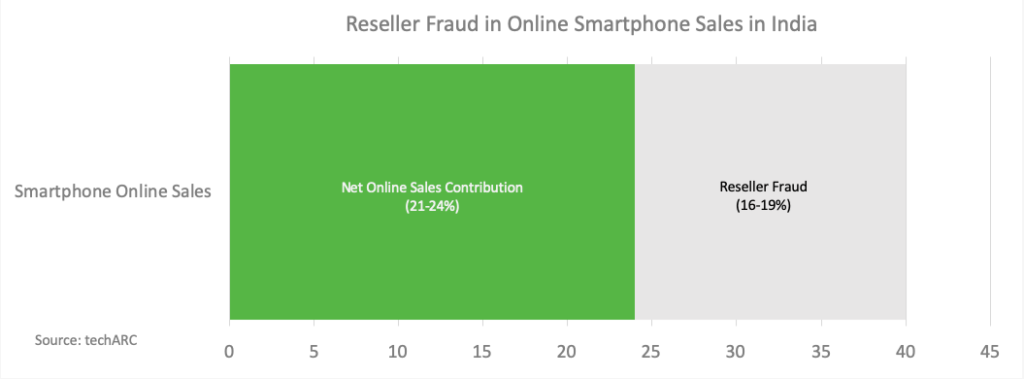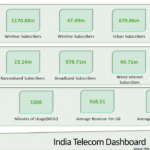Estimated 40-45% of online sales are reseller frauds adversely impacting the entire ecosystem.
Gurugram – Tuesday April 9, 2019: Smartphones have become one of the ace categories for ecommerce players including Amazon and Flipkart playing a pivotal role in increasing their GMV or Gross Merchandise Value. Smartphones contribute estimated 47% of the total sales value of ecommerce in India. Other electronics are also becoming lucrative categories including that of Smart TVs.
However, the reseller fraud – a fraud played upon by small to medium tier offline retailers who sneak through various checks and balances of ecommerce platforms and procure Smartphones in bulk for reselling purposes – is hurting the entire online ecommerce value chain of Smartphones.
Commenting on the techINSIGHT released, Faisal Kawoosa, Founder & Chief Analyst, techARC said, “Reseller fraud is a modern-day malpractice adopted by few making the entire digital commerce of Smartphones appear shoddy and shabby. The entire ecosystem needs to work in tandem to fight it out.”
The reseller fraud has several implications on the industry. Key among them being: –
Online Sales Contribution: The online sales contribution of online channels for Smartphones is pegged between 37-40% of the total unit sales. Over the past few years, there has been a healthy growth witnessed in the online sales channel which has forced many traditionally offline brands to dilute the channel strategy even to the extent of launching online only specific sub-brands, series and models. However, as per techARC recent estimates based on interaction with various actors in the value chain including retailers, distributors, logistics companies and others, around 40-45% of this sale is a fraudulent sale transaction initiated by a reseller. The purpose of the reseller is to purchase Smartphones in demand in bulk and sell them in offline taking the advantage of the brand pull as well as unavailability of such specific models online after the flash sales are over. With this volume of reseller fraud prevalent the pure online sales contribution declines to 21-24% of the total Smartphone sales.

Misappropriation of Discounts and Offers: The ecommerce platforms including Amazon and Flipkart have been spending huge money to develop the online channel of sales for Smartphones. They have been offering special discounts to attract consumers experience the medium as successfully shifting consumers to online buying is among major changes in consumer behaviour. This discount is for the end-users, many of whom would start their online transaction and gradually buy more products from these platforms. However, in reseller fraud, this discount benefit is taken up by the reseller, who sells these Smartphones at Market Operating Price or MoP and in some cases also charges premium for making a Smartphone available in an ‘out of stock’ period.
Strategic Importance of Online Channel: As the Smartphone OEMs see the online sales increasing to an extent which is inaccurate, the strategic importance of online channel increases for a brand. With the result a Smartphone brand dilutes the focus to develop in the online market place. However, the result would not commensurate the expectations as it does not result in expected sales volumes. At the same time, they defer their offline sales development which risks the growth of a brand.
Offline Prospects: Many of the offline channel partners are entering into alliances with predominantly online Smartphone brands. These channel partners get impressed with the online sales records of such brands and expect to gain from the pull such brands have created. However, since there could already a reseller selling in the offline market within their potential catchment area, it reduces the sales potential of formally engaged resellers and distributors. This adversely impacts the business plan of such distributors and other channel partners.
Online Expansion: For ecommerce platforms like Amazon and Flipkart the reported sales numbers indicate increasing grip on various markets across the country. These platforms usually strengthen their network at pin-code levels. However, in practice a substantial number of Smartphones sold by them are actually sold in the offline market. This inaccurate view of the market does not indicate scope for improvement for the online platforms and they assume that the markets are growing in such locations as well. This representation of the market facts hampers the online channel expansion across many geographies within the country.
Diluted Positioning: Many of the brands strategically want to position their brand, sub-brand, series or a particular model to be made available only through online or offline channels. With the reseller fraud, this positioning is diluted as the Smartphones become available across the channels, which fails the objectives of the brand.
Way Forward: Both the online as well as offline channel players shall have to come together to address this issue with support from the brands. While the brands could come heavily on such resellers who are caught in such unethical trade practices, the digital commerce platforms need to reinforce their business processes to arrest reseller fraud. At the same time, the offline trade bodies need to use their influence on such resellers not to resort to such practice which hurts the entire industry in the long run. The government also needs to look in detail into the issue as it could potentially lead to tax avoidance as well as creation of unaccounted wealth with such traders.





